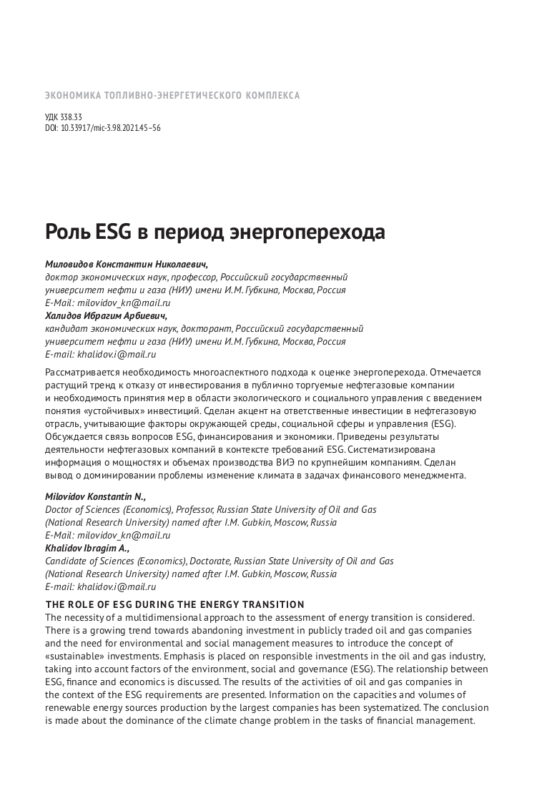ESG Strategies and Business Energy Transition in Modern Conditions
DOI: https://doi.org/10.33917/es-6.186.2022.76-85
The article considers the content of the ESG requirements as a transitional phase from unregulated globalization to the achievement of the UN Sustainable Development Goals until 2030, focuses on the social component, as well as on the relationship between achieving steering ejection with the restructuring of energy generating segments of national economies, incl. developing countries; it is emphasized that the developed countries, proclaiming the energy transition to renewable sources, use the potential of developing economies for their own purposes, which strengthens the trend towards state regulation of developing countries in order to achieve national economic objectives; it is analyzed that the unconditional implementation of the ESG principles led to a reduction in long-term investments in exploration and production of fossil energy sources, which in turn led to a sharp increase in prices in world markets; it is substantiated that the process of energy transition requires smooth implementation of the process, in connection with which a radical rejection of fossil fuels is unacceptable in modern conditions, and given the sanctions strategy of the Anglo-Saxon countries in relation to a number of states with an increased social component in the investment load of economic entities, in practice undermines the achievement of the goals of environmental justice, assistance to increase the welfare of the population and increase the social responsibility of companies to society.
References:
1. 17 tselei dlya preobrazovaniya nashego mira [17 Goals for Transforming Our World]. OON, available at: https://www.un.org/sustainabledevelopment/ru/
2. Shirokomasshtabnoe, bystroe i usilivayushcheesya izmenenie klimata — MGEIK: Press-reliz MGEIK [Widespread, Rapid and Accelerating Climate Change — IPCC: IPCC Press Release]. IPCC. 2021б available at: https://www.ipcc.ch/site/assets/uploads/2021/08/IPCC_WGI-AR6-Press-Release_ru.pdf.
3. Doklad Rosgidrometa ob osobennostyakh klimata na territorii RF za 2021 god [Roshydromet Report on the Climate Peculiarities in the Russian Federation for 2021]. Izmenenie klimata, 2022, no 95.
4. Henisz W., Koller T., Nuttall R. Five Ways That ESG Creates Value. McKinsey, available at: https://www.mckinsey.com/business-functions/strategy-andcorporate-finance/our-insights/five-ways-that-esg-creates-value.
5. ESG Trends 2021: Energy Transition. Oxford Business Group, 2021, available at: https://oxfordbusinessgroup.com/news/esg-trends-2021-energy-transition.
6. How will Net Zero 2050 plans affect emerging markets? Oxford Business Group, available at: https://oxfordbusinessgroup.com/news/how-will-net-zero-2050-plans-affect-emerging-markets.
7. MEA nazvalo 2021 god rekordnym po rostu “zelenoi” energetiki [IEA has Named 2021 a Record Year for the “Green” Energy Growth]. RBK, available at: https://trends.rbc.ru/trends/green/61a8b7f89a79475ba760b602.
8. Morrison R. Environmental, Social, and Governance Theory. Competitive Enterprise Institute, 2021, available at: https://cei.org/wp-content/uploads/2021/05/Richard-Morrison-ESG-Theory.pdf.







